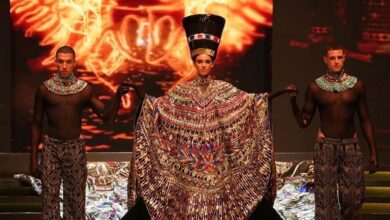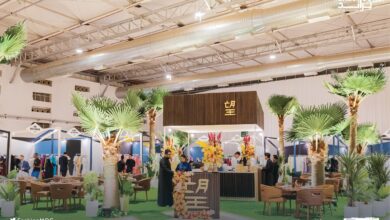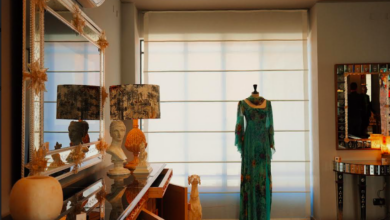Heba el-Awadi is the talent behind the two clothing line brands Hebz and El Horreya: Designs for Freedom. A designer in the spotlight, el-Awadi’s designs reach across the world and she has already featured in a number of local and international publications. The Cairo-based designer talked to Al-Masry Al-Youm about her business, her passion and her future plans.
Al-Masry Al-Youm: When did you begin your career as a fashion designer?
Heba el-Awadi: I graduated from London with a bachelor’s degree in fashion design and marketing and began my career in 2008 when I launched my first collection at the Wimbledon Fashion Week in the UK.
Al-Masry: What inspires you to design a piece or a collection?
El-Awadi: I am inspired by the feeling I get when I work. I travel often and absorb a lot from different parts of the world, which is reflected in my designs through colors, fits and styles. It has to be something I feel since I try to see things through the eyes of a client. My designs also reflect my lifestyle.
Al-Masry: In your opinion, what can’t a fashion designer do without: talent, education or connections?
El-Awadi: All three! Fashion is a business. What good is a product if people don’t know about it? You’ve got to be able to reach your customers and know about their lifestyle. You also need a good product, therefore talent is necessary. You need education to know the basics, to be able to carry out the logistics, and you need a brain to plan. Connections are needed to spread the word, to reach more customers and expand.
Al-Masry: Do you like to work with particular colors?
El-Awadi: That changes every season. I love subtle colors like grey, white and black and I’m a big fan of the color pink–particularly florescent pink. I love all metallic colors as well.
Al-Masry: What is Hebz’s connection with El Horreya?
El-Awadi: I’m a co-founder of El Horreya along with my sister Hana el-Awadi who is a jewlery designer, artist Dina Sabet, and architect Meram Maafa. There is no connection between the brands except that I am part of both. They are both my babies–something I started and watched grow. I am working on a line for El Horreya which we call “Freedom” and targets the younger generation.
Al-Masry: Which designs would you say are closest to your heart?
El-Awadi: My “Peace and Love” bracelets. They were created for a good cause and brought good fortune. The bracelets’ popularity picked up in other parts of the world and were featured in Vogue magazine in the UK–every designer’s dream. My new charm designs are just as amazing, but they originate from the “Peace and Love” collection.
Al-Masry: Do you feel you have strong competition in the Egyptian market?
El-Awadi: I don’t believe I have a direct competitor in Cairo. There are a lot of emerging designers at the moment. Everyone, I guess, has his or her own style and clients.
Al-Masry: Do you think Egyptians trust Egyptian products?
El-Awadi: I think the market in Cairo is accepting of Egyptian products because Egyptian products have begun to prove themselves. At first, people weren’t ready to accept Egyptian designers. It has taken a lot of hard work to produce high quality products and slowly change the consumer’s mind.
Al-Masry: Do you think one day Egyptian designers will be able to compete on an international level?
El-Awadi: Yes, of course! We are getting there–slowly. Nothing is impossible. You just need to work hard. Nothing comes without effort.
Al-Masry: Who are your favorite designers–locally and internationally?
El-Awadi: There are great local talents,but obviously my two brands, Hebz and El Horreya, are my favorites. Internationally, I like a lot of designers including Matthew Willamson, Balmain, Bottega Venetta, Alberta Feretti, Alice Temprely, and Rick Owens.




